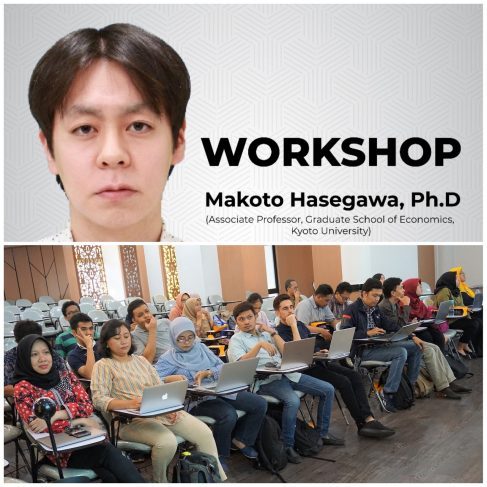Workshop PPIA and LPEM FEB UI: Multinational Corporate Tax Reform
Nino Eka Putra ~ Humas FEB UI
DEPOK – Accounting Science Postgraduate Program (PPIA) and the Institute for Economic and Community Research (LPEM) FEB UI held a workshop via video conference on the topic “Territorial Tax Reform and Profit Shifting by US and Japanese Multinationals” which was opened by Yulianti Abbas as Chair of the PPIA Study Program and took place in the KKI Auditorium, Building B, on Tuesday (3/3/2020).
Associate Professor of the Graduate School of Economics at Kyoto University, Makoto Hasegawa conveyed that in 2009, Japan began to free dividends paid by Japanese-owned foreign subsidiaries to their parent companies from taxation of the country of origin. This tax reform changed the Japanese corporate tax system to a territorial tax system that freed foreign income from home country taxation.

Reported sensitivity of earnings of Japanese multinationals compared to US multinational corporations on tax incentives for profit diversion, with a focus on host country corporate tax rates and the adoption of Japanese territorial tax regimes.
“I found that, on average, the profits of US-owned foreign subsidiaries were more sensitive to the host country’s tax rates compared to foreign-owned Japanese subsidiaries during the entire study period from 2004 to 2016 and during the sub-period from 2004 to 2007. “When the two countries use a tax system throughout the world,” said Makoto Hasegawa.
Makoto continued, the main findings in this study were twofold, namely the advantages of foreign subsidiaries owned by the US were on average more sensitive to the host country tax rates than foreign subsidiaries owned by Japan.
The semi elasticity of pre-tax earnings in relation to the host country’s corporate tax rates is greater for US-owned foreign subsidiaries than Japanese-owned foreign subsidiaries during the entire study period from 2004 to 2016 and also for the period from 2004 to 2007, when the two countries use a worldwide tax system. This shows that the average Japanese-owned subsidiary is involved in the transition of profits to a lower level than the average US-owned subsidiary.
However, the semi-tax elasticity of pre-tax profits for Japanese-owned foreign subsidiaries, especially large subsidiaries, rose sharply in response to the announcement of the territorial tax regime in 2008, relative to US-owned foreign subsidiaries.
As a result of these reforms, the semi-elasticity of tax from profit before tax for Japanese-owned subsidiaries is greater than US-owned subsidiaries from 2008 to 2012. Given that other tax provisions can affect earnings diversion behavior.
The caveat is that the profit-shifting response from Japanese multinationals has diminished in the last two years from the 2015 and 2016. data periods. “The semi-elasticity of tax of Japanese-owned subsidiaries has declined over the past two years. This is also the case for large US-owned subsidiaries,” he said.
Reported earnings from major US and Japanese subsidiaries have suddenly become less sensitive to the host country’s corporate tax rates for two years and assume that they are not related to Japan’s 2009 territorial tax reforms, but are caused by other factors.
“However, it should be noted that Japanese multinationals have become more sensitive to incentives for profit transfer for several years after the announcement and implementation of the territorial tax system,” he concluded. (hjtp)





